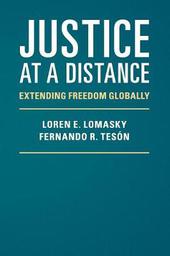
|
Justice at a Distance: Extending Freedom Globally
Paperback / softback
Main Details
| Title |
Justice at a Distance: Extending Freedom Globally
|
| Authors and Contributors |
By (author) Loren E. Lomasky
|
|
By (author) Fernando R. Teson
|
| Physical Properties |
| Format:Paperback / softback | | Pages:293 | | Dimensions(mm): Height 229,Width 152 |
|
| Category/Genre | Ethics and moral philosophy
Social and political philosophy |
|---|
| ISBN/Barcode |
9781107536029
|
| Classifications | Dewey:172.2 |
|---|
| Audience | | Tertiary Education (US: College) | | Professional & Vocational | |
|---|
|
Publishing Details |
| Publisher |
Cambridge University Press
|
| Imprint |
Cambridge University Press
|
| Publication Date |
29 September 2015 |
| Publication Country |
United Kingdom
|
Description
The current global-justice literature starts from the premise that world poverty is the result of structural injustice mostly attributable to past and present actions of governments and citizens of rich countries. As a result, that literature recommends vast coercive transfers of wealth from rich to poor societies, alongside stronger national and international governance. Justice at a Distance, in contrast, argues that global injustice is largely home-grown and that these native restrictions to freedom lie at the root of poverty and stagnation. The book is the first philosophical work to emphasize free markets in goods, services, and labor as an ethical imperative that allows people to pursue their projects and as the one institutional arrangement capable of alleviating poverty. Supported by a robust economic literature, Justice at a Distance applies the principle of noninterference to the issues of wealth and poverty, immigration, trade, the status of nation-states, war, and aid.
Author Biography
Loren Lomasky is Cory Professor of Political Philosophy at the University of Virginia. Lomasky is the author of Persons, Rights and the Moral Community (1987) for which he was awarded the 1990 Matchette Foundation Book Prize for best philosophy book published during the preceding two years by an author under the age of forty. He coauthored Democracy and Decision: The Pure Theory of Electoral Preference (Cambridge, 1993) with Geoffrey Brennan. His essay, 'Is There a Duty to Vote?', also coauthored with Brennan, was awarded the 2003 Gregory Kavka/University of California, Irvine Prize in Political Philosophy by the American Philosophical Association. Fernando R. Teson is the Tobias Simon Eminent Scholar at Florida State University. He is the author of Humanitarian Intervention: An Inquiry into Law and Morality, 3rd edition and Rational Choice and Democratic Deliberation: A Theory of Discourse Failure (with Guido Pincione). He has written more than fifty articles in journals, including Ethics and International Affairs, the Journal of Philosophy, the American Journal of International Law and Social Philosophy and Policy.
Reviews'Robust, engaging, and smart ... Lomasky and Teson start from first philosophical principles before considering several highly topical issues, including diplomatic pressure, boycotts, the use of mercenaries, political assassination, humanitarian intervention, and global trade. [This study] offers a stimulating and powerful alternative to cosmopolitan egalitarian accounts of global justice that have dominated discussions ... a tour de force.' James Pattison, University of Manchester 'A forceful and elegant defense of global freedom, addressing contemporary controversies concerning global poverty, trade, immigration, our duties to distant others, and war.' Christopher W. Morris, University of Maryland 'Discussions of the impact of international aid on development challenges typically have two big problems: first, they don't have a proper theory of why poor countries are poor in the first place; second, they take place without making clear the normative assumptions underpinning the policies. This highly original book proposes a way to simultaneously solve both problems.' James A. Robinson, Wilbur A. Cowett Professor of Government, Harvard University, Massachusetts 'What do we owe the world's poor? Not resource egalitarianism, but the opportunity, the dignity, and the freedom to participate in the global market economy, and to realize the great gains from productive specialization and peaceful cooperation ... A must read for all students of philosophy, politics, and economics and in particular for those who care about the plight of the least advantaged throughout the world and the fundamental questions of economic and political development.' Peter Boettke, George Mason University, Virginia 'A mainstream economist might ask why philosophers of global justice seem so antagonistic to the institutions that actually spur economic development and alleviate poverty ...A good theory of global justice must be grounded in, not ignorant of, development economics. Lomasky and Teson take the facts seriously, and thus have produced a remarkable theory of global justice that will change the conversation for the better.' Jason Brennan, McDonough School of Business, Georgetown University 'An important and timely contribution to the debate on global justice. Lomasky and Teson keep their eyes on the big picture, asking some of the most difficult and important questions of our time, while offering answers that might actually help. They have written a clear, incisive, and empirically informed book that fills a real hole in the debate. A statement that all in the field will have to contend with.' Bas van der Vossen, University of North Carolina, Greensboro 'Justice at a Distance presents a powerful case that justice requires letting others alone. This seemingly simple directive has the potential to massively improve the welfare of individuals across the globe. With their sophisticated grasp of economics, philosophy, and law, Lomasky and Teson persuasively demonstrate that the best way to help people is to stop hurting them through ill-conceived policies, such as trade and immigration restrictions, that continue to immiserate the world's poor.' Jonathan Klick, University of Pennsylvania
|